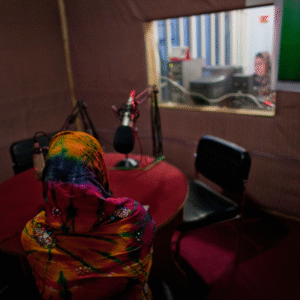14-year-old Malaika from the Afghanistan Newsroom shares who her role models are and the challenges they face

Hundreds of media outlets have closed in Afghanistan since the Taliban returned in 2021.
Picture by: ton koene | Alamy
Article link copied.
November 7, 2025
What I’ve learned from Afghan journalists who report in secret

As a journalism student in Afghanistan, I live in a country where the truth has become dangerous, and telling it can cost you your freedom – or your life. And yet, every day, I learn from those who do it anyway.
Some of the most courageous journalists I know cannot show their faces. They write under pseudonyms, hide their work from neighbours, and risk everything just to send out a few lines of truth.
Harbingers’ Weekly Brief
One of them is Khadija Haidary. She reports from inside Afghanistan using a false name and encrypted apps. Her stories get published, but her identity stays hidden, for her own safety. What she does is journalism. It is also resistance.
Learning journalism under repression feels like studying a fading art form. In class, we talk about ethics, sources and story structure but outside the classroom, I see reporters being silenced, arrested or forced into exile.
Since the Taliban returned in 2021, hundreds of media outlets have been shut down and journalists face numerous restrictions on what issues they can cover and who they can interview. In July, the Afghanistan Journalists Center reported that there were at least 140 incidents of media freedom violations in the first six months of July, a sharp increase from the previous year.
Women journalists, especially, face unimaginable barriers. And yet, some remain.
They report from underground, not because it’s safe, but because it’s necessary.
From them, I’ve learned that journalism isn’t just about press conferences or public headlines. It’s about listening to those who are afraid to speak. It’s about finding ways to tell the truth when every door is closed. Even if your real name can never appear beside your story, the story itself matters.
There is a kind of power in this hidden work. These journalists, mostly unseen, are documenting the realities others want erased: stories of school closures, secret protests, poverty and survival. They work with limited resources, often without pay, and under constant surveillance. But they continue, because without their voices, the world would know even less about what is happening in Afghanistan.
To me, they are invisible heroes.I read their reports not only as a student, but as someone who wants to follow in their footsteps. But it’s terrifying. I ask myself: do I have that kind of courage? Can I write in the dark, knowing the risks?
This is why underground journalism deserves more global recognition and support. These reporters need protection, platforms and partners. They should not be forgotten just because they cannot speak out loud.
The world may be looking away from Afghanistan, but Afghan journalists are still watching, still writing. Their survival is also the survival of truth. And for students like me, their example is both a lesson and a lifeline. We are learning not only how to report but why it matters more than ever.
Written by:

Afghanistan
Contributor
LEARN Journalism Club
Illustration by Yuliia Muliar
Born in 2011, Malaika is currently studying journalism through the joint project between Harbingers’ Magazine and LEARN Afghan.
Her educational goal is to study business and build a career as a successful businesswoman. In her free time, Malaika enjoys reading books to expand her knowledge about the world of business.
Malaika speaks Pashto, Urdu and English.
Due to security concerns the author’s image and surname have been omitted
Edited by:

🌍 Join the World's Youngest Newsroom—Create a Free Account
Sign up to save your favourite articles, get personalised recommendations, and stay informed about stories that Gen Z worldwide actually care about. Plus, subscribe to our newsletter for the latest stories delivered straight to your inbox. 📲
© 2025 The Oxford School for the Future of Journalism


